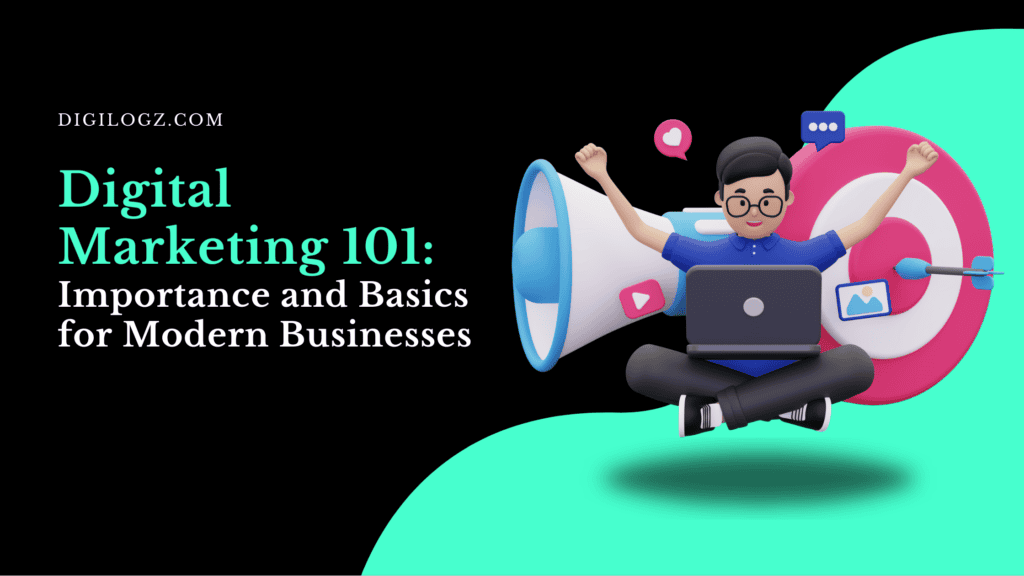In today’s hyper-connected world, digital marketing has become an indispensable tool for businesses of all sizes. From small startups to multinational corporations, the ability to effectively reach and engage with customers online can make or break a company’s success. In this comprehensive guide, we’ll explore the importance of digital marketing and delve into the basics that every modern business should know to thrive in the digital landscape.
Introduction to Digital Marketing
Gone are the days when traditional marketing methods like print ads and billboards were sufficient to capture audience attention. With the advent of the internet and the proliferation of digital devices, consumers are now more connected than ever before. Digital marketing encompasses a wide range of strategies and tactics aimed at promoting products or services through online channels.
Introduction to Digital Marketing
| Topic | Description |
|---|---|
| Website Optimization | Ensuring that your website is user-friendly, fast-loading, and optimized for search engines. |
| Search Engine Optimization (SEO) | Improving your website’s visibility in search engine results pages through organic tactics such as keyword optimization and link building. |
| Content Marketing | Creating and distributing valuable, relevant content to attract and retain a clearly defined audience. |
| Social Media Marketing | Leveraging social media platforms to connect with your audience, build brand awareness, and drive engagement. |
Understanding the Importance of Digital Marketing for Modern Businesses
The importance of digital marketing cannot be overstated in today’s highly competitive business environment. Unlike traditional marketing, digital marketing offers unparalleled reach and targeting capabilities. Through various online channels such as search engines, social media, email, and websites, businesses can connect with their target audience in a more personalized and meaningful way.
Moreover, digital marketing allows for precise tracking and measurement of campaign performance, enabling businesses to optimize their strategies for maximum effectiveness. In an era where data is king, the ability to analyze customer behavior and preferences is invaluable for driving business growth.
Digital Marketing 101: Importance and Basics for Modern Businesses
In today’s hyper-connected world, digital marketing has become an indispensable tool for businesses of all sizes. From small startups to multinational corporations, the ability to effectively reach and engage with customers online can make or break a company’s success. In this comprehensive guide, we’ll explore the importance of digital marketing and delve into the basics that every modern business should know to thrive in the digital landscape.
Understanding the Importance of Digital Marketing for Modern Businesses
| Topic | Description |
|---|---|
| Email Marketing | Sending targeted messages to your email subscribers to promote products, announce special offers, and nurture customer relationships. |
| Pay-Per-Click (PPC) Advertising | Placing ads on search engines and other websites and paying only when someone clicks on them. |
| Influencer Marketing | Partnering with influential individuals on social media to promote your products or services to their followers. |
| Online Public Relations (PR) | Managing your online reputation and building positive relationships with the media and other online influencers. |
The Evolution of Digital Marketing
Digital marketing has come a long way since its inception. What started as simple banner ads and email campaigns has evolved into a multifaceted discipline encompassing a wide range of tactics and technologies. From the rise of search engine optimization (SEO) to the advent of influencer marketing and artificial intelligence (AI), the digital marketing landscape is constantly evolving, presenting both challenges and opportunities for businesses.
The Evolution of Digital Marketing
| Topic | Description |
|---|---|
| Developing a Digital Marketing Strategy | A successful digital marketing strategy starts with clear goals and objectives. Whether your aim is to increase brand awareness, drive website traffic, generate leads, or boost sales, it’s essential to define what you hope to achieve and how you plan to measure success. |
Key Components of Digital Marketing
A successful digital marketing strategy typically involves a combination of different components, each serving a specific purpose in reaching and engaging with the target audience. Some of the key components include:
- Website Optimization: Ensuring that your website is user-friendly, fast-loading, and optimized for search engines.
- Search Engine Optimization (SEO): Improving your website’s visibility in search engine results pages through organic tactics such as keyword optimization and link building.
- Content Marketing: Creating and distributing valuable, relevant content to attract and retain a clearly defined audience.
- Social Media Marketing: Leveraging social media platforms to connect with your audience, build brand awareness, and drive engagement.
- Email Marketing: Sending targeted messages to your email subscribers to promote products, announce special offers, and nurture customer relationships.
- Pay-Per-Click (PPC) Advertising: Placing ads on search engines and other websites and paying only when someone clicks on them.
- Influencer Marketing: Partnering with influential individuals on social media to promote your products or services to their followers.
- Online Public Relations (PR): Managing your online reputation and building positive relationships with the media and other online influencers.
Developing a Digital Marketing Strategy
A successful digital marketing strategy starts with clear goals and objectives. Whether your aim is to increase brand awareness, drive website traffic, generate leads, or boost sales, it’s essential to define what you hope to achieve and how you plan to measure success.
Next, it’s important to identify your target audience and understand their needs, preferences, and online behavior. By creating buyer personas and conducting market research, you can tailor your messaging and tactics to resonate with your target audience effectively.
Choosing the right digital marketing channels is also crucial for success. Depending on your goals and target audience, you may want to focus on specific channels such as search engines, social media platforms, or email marketing. It’s essential to allocate your resources wisely and prioritize channels that offer the best return on investment (ROI) for your business.
Creating a content calendar can help you stay organized and ensure a consistent presence across your chosen channels. By planning and scheduling your content in advance, you can maintain a steady stream of relevant and engaging content that resonates with your audience.
Measurement and Analytics in Digital Marketing
One of the key advantages of digital marketing is the ability to track and measure campaign performance in real-time. By leveraging tools such as Google Analytics, you can gain valuable insights into how your audience interacts with your website and digital assets.
Key performance indicators (KPIs) such as website traffic, conversion rates, and return on ad spend (ROAS) can help you assess the effectiveness of your digital marketing efforts and identify areas for improvement. By continuously monitoring and analyzing your data, you can refine your strategies and optimize your campaigns for better results.
Case Studies: Successful Digital Marketing Campaigns
To illustrate the power of digital marketing, let’s take a look at some real-life examples of successful campaigns:
- Airbnb’s “Live There” Campaign: By leveraging user-generated content and storytelling, Airbnb was able to position itself as more than just a place to stay but as a platform for authentic travel experiences.
- Dollar Shave Club’s Viral Video: Dollar Shave Club’s humorous and irreverent video went viral, generating millions of views and catapulting the brand to fame virtually overnight.
- Nike’s “Just Do It” Campaign: Nike’s iconic slogan has become synonymous with inspiration and empowerment, resonating with audiences around the world and solidifying the brand’s position as a leader in athletic apparel.
These case studies demonstrate the power of creativity, authenticity, and strategic thinking in digital marketing.
Case Studies: Successful Digital Marketing Campaigns
| Campaign Name | Description |
|---|---|
| Airbnb’s “Live There” | Leveraging user-generated content and storytelling to position itself as a platform for authentic travel experiences. |
| Dollar Shave Club’s Viral Video | Creating a humorous and irreverent video that went viral, generating millions of views and catapulting the brand to fame. |
| Nike’s “Just Do It” | Establishing an iconic slogan that resonates with audiences worldwide, solidifying the brand’s position as a leader in athletic apparel. |
Common Mistakes to Avoid in Digital Marketing
While digital marketing offers tremendous opportunities for businesses, it’s essential to avoid common pitfalls that can undermine your efforts. Some common mistakes to avoid include:
- Neglecting mobile optimization: With more people accessing the internet on mobile devices than ever before, it’s crucial to ensure that your website and digital assets are optimized for mobile.
- Ignoring social media engagement: Social media is not just a broadcast platform but a two-way communication channel. Engaging with your audience and responding to comments and messages can help build trust and loyalty.
- Overlooking data privacy and security: With increasing concerns about data privacy and security, it’s essential to comply with regulations such as the General Data Protection Regulation (GDPR) and take steps to protect customer data from unauthorized access or misuse.
By being mindful of these common mistakes, you can avoid costly missteps and maximize the impact of your digital marketing efforts.
Future Trends in Digital Marketing
Looking ahead, several trends are shaping the future of digital marketing:
- Artificial intelligence (AI) and machine learning: AI-powered tools and algorithms are enabling marketers to automate tasks, personalize experiences, and gain deeper insights into customer behavior.
- Voice search and smart assistants: As voice-activated devices like Amazon Echo and Google Home become increasingly popular, optimizing for voice search is becoming essential for businesses to stay competitive.
- Augmented reality (AR) and virtual reality (VR): AR and VR technologies are creating immersive brand experiences and revolutionizing how consumers interact with products and services.
- Sustainability and social responsibility: With growing consumer awareness of environmental and social issues, brands that demonstrate a commitment to sustainability and social responsibility are resonating with audiences and gaining a competitive edge.
By staying abreast of these trends and embracing innovation, businesses can stay ahead of the curve and continue to drive growth in the digital age.
In conclusion, digital marketing is not just a trend but a fundamental shift in how businesses connect with customers and drive growth. By understanding the importance of digital marketing and mastering the basics, businesses can unlock new opportunities, reach new audiences, and stay ahead of the competition in today’s rapidly evolving digital landscape. Whether you’re a small startup or a multinational corporation, embracing digital marketing is essential for long-term success in the digital age.



